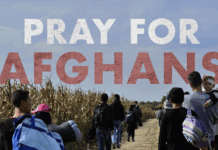More than 70 evangelical churches, organisations and leaders were included in a ‘blacklist’ of around 400 people, organisations, and churches described as a “reactionary right” and “anti-democratic,” causing a controversy in Argentina, according to Evangelical Focus https://evangelicalfocus.com .

Screenshot of the interactive map of the website ReaccionConservadora
Among them where national entities such as the Argentinian Evangelical Alliance (ACIERA), the Argentinian Baptist Theological Seminary, Youth With A Mission and the platform Parliament and Faith; international organisations such as the The Billy Graham Evangelistic Association, the Ibero-American Congress for Family and Life and ADF; evangelical leaders such as the recently died Luis Palau and other members of his family; politicians such as Cynthia Hotton and Nadia Márquez, and denominations such as the Assemblies of God.
The news website Evangélico Digital, a member of the Areópago Protestante media group of the Spanish Evangelical Alliance, was also included in the “black list.”
Non-evangelical organisations included Doctors for Life and the Roman Catholic Episcopal Conference.
The promoters of the list had pointed to the “evangelical and Catholic powers” as some of the actors that needed to be exposed because they “are masked in secular organisations” with the aim of “obstructing the sexual and reproductive rights and fighting ‘gender ideology.’”
Evangelical churches call to respect “plurality and healthy coexistence”
In a statement sent by the Baptist Confederation of Argentina and published on Evangélico Digital, Hugo Márquez, a pastor in the city of Neuquén who had himself been included in the “black list,” said many Christians were “worried about the aberrant fact that in a democracy and a state with the rule of law, ‘black lists’ are published for the only crime of thinking differently.”
Statement sent by the Baptists Confederation of Argentina.
“These behaviours,” Márquez added, come from “authoritarian groups which do not accept the freedom of opinion but try to impose a single thought.” The pastor called the “living, active and participative church” to continue its work for the benefit of family and life in Argentina.
The Evangelical Alliance in Argentina (ACIERA) also rejected in a statement the “intimidation” which adds to the “profanation of worship places” in recent months with the “indifference of the authorities that should be looking after the healthy coexistence.”
They denounced how the formation of an unofficial “thought police” contributes to a “culture of hate” that should have no place in a democracy where there is “plurality of thought.” — ASSIST News
The author of this story, Michael Ireland, is a self-supported media missionary with ANS. Click here to support him as a missionary journalist.



